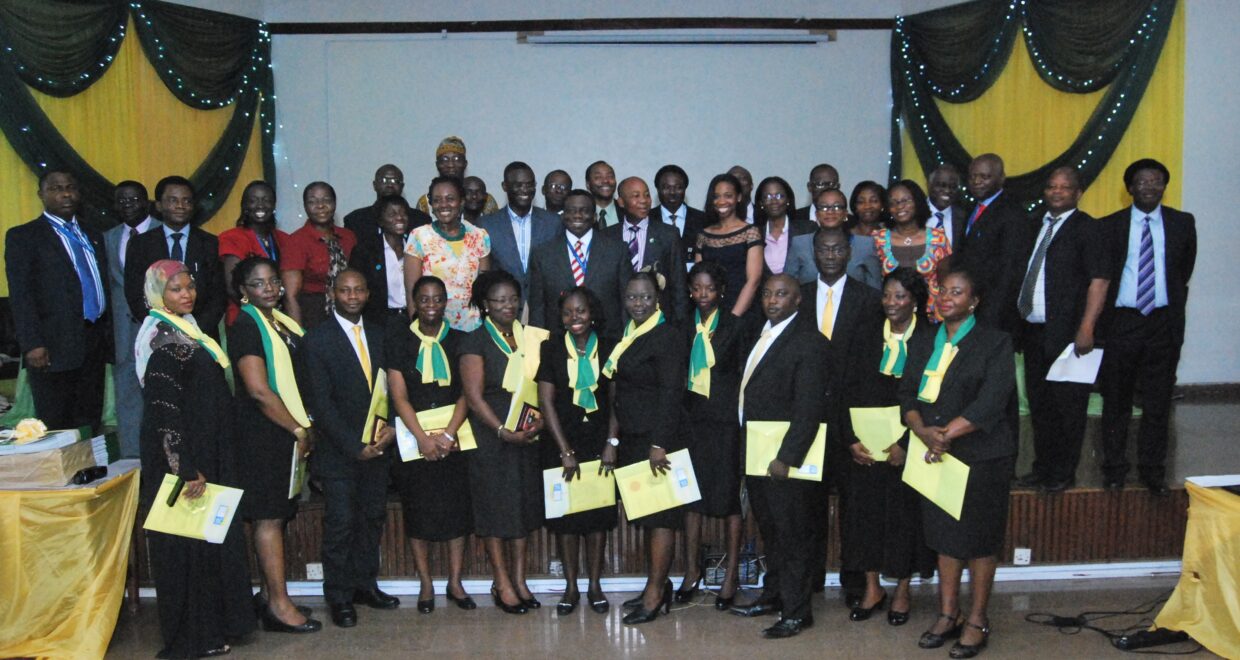From a small seed to a giant Iroko tree: A postgraduate training programme in Child and Adolescent Mental Health in Africa
Graduation ceremony of the First Set of the MSc. CAMH programme on June 16, 2014. Photo shows graduands on front row and on the back row, we have the leadership of the University of Ibadan, the University College Hospital, Founding Director of CCAMH, Faculty from the University of Ibadan, Harvard Medical School & Imperial College London.
The RCPsych Article of the Month for February is ‘A postgraduate training programme in child and adolescent mental health in a lower-middle-income country: a partnership model from Nigeria‘ written by authors Olayinka Omigbodun, Cornelius Ani and published in BJPsych International. The blog is written by authors Olayinka Omigbodun and Cornelius Ani.
Sub-Saharan Africa (SSA) has the youngest population of any region in the world with 70% under the age of 30 years. This youthful demographic profile can be both a blessing and a challenge. While the youth have the potential to drive economic development, meeting their educational, social, and health needs can over-stretch already limited human and material resources. Worldwide, an estimated 10% of children and young people (CYP) suffer from mental disorders and this amounts to millions of CYP in SSA. Meeting this great need is a challenge because the region has only 1.6 mental health workers per 100,000 population. This is strikingly low compared with 45 mental health workers per 100,000 population in Europe. This huge gap raises questions about how the mental health needs of CYP in the SSA region can be met. Part of the answer is to expand the number and range of professionals with child and adolescent mental health (CAMH) expertise in the region.
We recognised that expanding the CAMH workforce in SSA would require an innovative approach including international partnerships, a comprehensive multidisciplinary multi-professional curriculum. Thus, the University of Ibadan, Harvard Medical School, Imperial College London, and Sangath India worked together to develop an 18-month master’s programme in CAMH. Unlike other MSc programmes that are mainly academic, the CAMH programme has a significant hands-on clinical focus such that all graduates can provide direct clinical CAMH care. The students are also trained to initiate and run CAMH services, provide leadership, training and supervision, and to conduct CAMH research. For quality control and transparency, the students are empowered to provide anonymised feedback on the programme, which are acted on. The programme uses freely available teaching resources and adopts a train the trainer approach to ensure sustainability. Thus, by the 10th year, the programme’s alumni are providing most of the teaching as well as leadership and administration.
The programme has now trained 166 CAMH professionals from 14 SSA countries. Graduates include a wide range of professionals such as psychiatrists, pediatricians, medical officers, nurses, pharmacists, psychologists, counsellors, physiotherapists, occupational therapists, communication and language specialists, health education specialists, and specialists teachers. Graduates are running clinical CAMH services in their countries – mostly pioneered by them. Several graduates are in international CAMH leadership positions. Others are leading services in Non-Governmental Organisations supporting CAMH provisions in Africa. Four graduates are pursing PhDs. The student’s research projects have produced 23 peer-reviewed publications – including pioneering work on locally adapted psychological interventions.
The CAMH programme was a small seed that has grown into a giant Iroko tree. We wanted to share our learning as a means of encouraging colleagues to consider starting similar programmes in other Low and Middle Income Countries (LMICs). If we can do it, so can others. Colleagues should feel encouraged to have a go. We are happy to share more learning with colleagues in LMICs who would like to start similar programmes.
NB: Funding to start the Centre for Child & Adolescent Mental Health, University of Ibadan was received in 2010 through MacArthur’s Foundation’s program in Higher Education in Africa
This inspiring paper describes the development and implementation of a long-term postgraduate child and adolescent mental health training programme in Nigeria, made possible through an international partnership between the University of Ibadan, Harvard Medical School, Imperial College London, and Sangath. It included Nigerian child and adolescent psychiatrists based in the collaborating universities outside Nigeria, who had trained and worked in the country and were familiar with the local context. Within 10 years, this programme trained a large number of professionals from 14 African countries. Many of them pioneered clinical services in their countries, developed training in child and adolescent mental health, and assumed leadership positions. At a time when child and adolescent mental health is increasingly being recognised as a major public health issue and related services are globally lacking, it is heartening to read about this fruitful and culturally sensitive train-the-trainer approach which led to such positive sustained results.
Marinos Kyriakopoulos
Editor-in-Chief, BJPsych International




